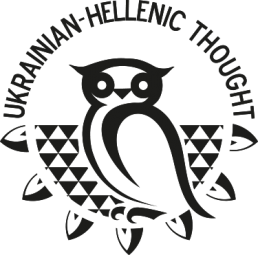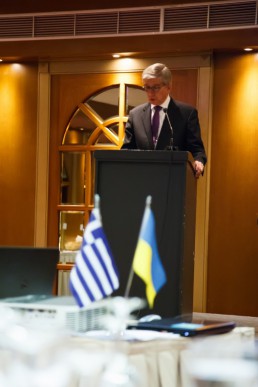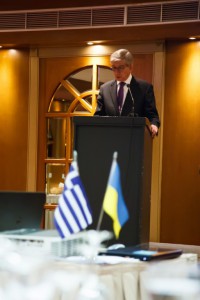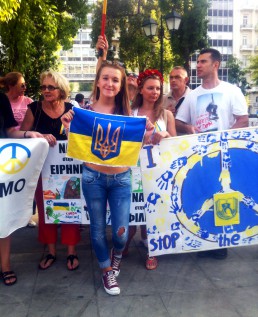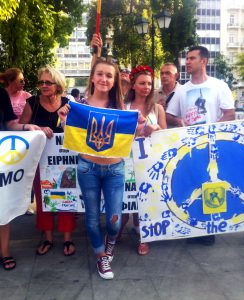Ukrainian World Congress President Eugene Czolij participated in commemoration of the 50th anniversary of the UWC in Greece
On 20-23 April 2017 Ukrainian World Congress (UWC) President Eugene Czolij fulfilled a working visit to Athens, Greece, in the framework of commemorations marking the 50th anniversary of the UWC.
On 22 April 2017 the UWC President delivered the keynote address during a banquet to commemorate the 50th anniversary of the UWC organized by the UWC member organization, Association of the Ukrainian Diaspora in Greece “Ukrainian-Hellenic Thought”, chaired by Halyna Masliuk. In his address Eugene Czolij highlighted the many achievements of the UWC throughout its 50-year history and called upon Ukrainians in Greece to continue supporting Ukraine in the defence of its territorial integrity.Volunteers in the Ukrainian community in Greece and Greek friends of Ukraine were acknowledged by the UWC President with Certificates of Recognition for their contribution to the development of Ukrainian community life in Greece.
The evening program included a screening of the short documentary film 50 years of the Ukrainian World Congress and performances by local artists.
The Ukrainian community in Greece and representatives of UWC member organizations from Australia, Germany, Great Britain, Estonia, Hungary, Portugal and the United States, were joined at the commemoration by Chargé d'affaires of the Embassy of Ukraine in Greece Nataliia Kosenko, mayors and representatives of the municipalities of Athens, Zohraf, Penteli, Perama, Mandra-Idyllia, and representatives of political, diplomatic, academic and cultural circles of Greece and Ukraine. Banquet guests received small mementos crafted by members of the Greek community in Mariupol, Ukraine, as a symbol of the centuries-old ties between the Ukrainian and Greek peoples.
Earlier that day Eugene Czolij visited the Ukrainian heritage school sponsored by the Association of the Ukrainian Diaspora in Greece “Ukrainian-Hellenic Thought” where he delivered a message to students on the importance of maintaining one’s heritage.
The UWC President also discussed effective means of cooperation to further Ukrainian interests during a meeting with representatives of UWC member organizations from Australia, Germany, Great Britain, Greece, Estonia, Hungary, Portugal and the United States.
On 21 April 2017 the UWC President participated in Divine Liturgy at St. Nicholas Ukrainian Greek-Catholic Church in Athens, and addressed the local community on the activities of the UWC.
During these events Eugene Czolij was joined by UWC First Vice President and President of the European Congress of Ukrainians Jaroszlava Hartyanyi, UWC Secretary-General and President of the Australian Federation of Ukrainian Organisations Stefan Romaniw, UWC Vice President and President of the Congress of Ukrainians in Estonia Vira Konyk, Chair of the UWC International Task Force to Stop Human Trafficking and President of the Association of the Ukrainian Diaspora in Greece “Ukrainian-Hellenic Thought” Halyna Masliuk and Director of the UWC Mission to International Organizations in Brussels Maryna Iaroshevych.
“The Ukrainian World Congress congratulates the Ukrainian community in Greece on raising awareness of the UWC and its activities during this 50th anniversary year and calls for the further strengthening of its cooperation with the UWC in attaining common goals,” stated UWC President Eugene Czolij.
The UWC is the international coordinating body for Ukrainian communities in the diaspora representing the interests of over 20 million Ukrainians. The UWC has a network of member organizations and ties with Ukrainians in 53 countries. Founded in 1967, the UWC was recognized in 2003 by the United Nations Economic and Social Council as a non-governmental organization with special consultative status.
 Е. Чолій виступає на відзначенню 50-ліття СКУ
E. Czolij addressing UWC 50th anniversary commemoration
Е. Чолій виступає на відзначенню 50-ліття СКУ
E. Czolij addressing UWC 50th anniversary commemoration  Учасники відзначення 50-ліття СКУ
Participants of UWC 50th anniversary commemoration
Учасники відзначення 50-ліття СКУ
Participants of UWC 50th anniversary commemoration
 Е. Чолій та члени Ради директорів СКУ з учнями та вчителями
Української суботньої школи в Греції
E.Czolij and members of UWC Board of Directors with teachers and students
of Ukrainian heritage school in Greece
Е. Чолій та члени Ради директорів СКУ з учнями та вчителями
Української суботньої школи в Греції
E.Czolij and members of UWC Board of Directors with teachers and students
of Ukrainian heritage school in Greece

Е. Чолій з українською громадою в Свято-Миколаївській
Українській Греко-Католицькій Церкві в Афінах
E. Czolij with Ukrainian community at St. Nicholas
Ukrainian Greek-Catholic Church in Athens Перед пам’ятником Тарасу Шевченку.
Зліва направо: Н. Косенко, Е. Чолій, Г. Маслюк
At the monument to Taras Shevchenko.
From left to right: N. Kosenko, E. Czolij, H. Masliuk
Перед пам’ятником Тарасу Шевченку.
Зліва направо: Н. Косенко, Е. Чолій, Г. Маслюк
At the monument to Taras Shevchenko.
From left to right: N. Kosenko, E. Czolij, H. Masliuk
 Перед пам’ятником Тарасу Шевченку.
Зліва направо: Н. Косенко, Е. Чолій, Г. Маслюк
At the monument to Taras Shevchenko.
From left to right: N. Kosenko, E. Czolij, H. Masliuk
Перед пам’ятником Тарасу Шевченку.
Зліва направо: Н. Косенко, Е. Чолій, Г. Маслюк
At the monument to Taras Shevchenko.
From left to right: N. Kosenko, E. Czolij, H. Masliuk
28 квітня 2017 р.
ПРЕСОВЕ ПОВІДОМЛЕННЯ
Президент Світового Конґресу Українців Евген Чолій узяв участь
у відзначенні 50-ліття СКУ в Греції
20-23 квітня 2017 р. Президент Світового Конґресу Українців (СКУ) Евген Чолій здійснив робочий візит до Афін, Греція, в рамках відзначення 50-ліття СКУ.22 квітня 2017 р. Президент СКУ виступив з головною доповіддю на банкеті, який з нагоди 50-ліття СКУ організувала складова організація СКУ - Товариство української діаспори в Греції “Українсько-грецька думка” на чолі з Галиною Маслюк. У своїй доповіді Евген Чолій наголосив на численних досягненнях СКУ протягом 50-літньої історії та закликав українців у Греції до підтримки України в захисті своєї територіальної цілісності.
Активісти української громади в Греції і греки, прихильники України, були нагороджені Президентом СКУ почесними грамотами за їхній вагомий внесок у розвиток українського суспільного життя в Греції.
Вечірня програма влючала висвітлення короткого документального фільму 50 років Світового Конґресу Українців і виступ місцевих українських митців.
Разом з українською громадою Греції та представниками складових організацій СКУ з Австралії, Великої Британії, Естонії, Німеччини, Португалії, США та Угорщини, на банкеті були присутні Тимчасовий повірений-радник України в Греції Наталія Косенко, мери та представники муніципалітетів Афін, Зографу, Пентелі, Перами, Мандра-Ідилії та інші представники політичних, дипломатичних, наукових і культурних кіл Греції і України.
Гості банкету отримали маленькі пам’ятки, які виготовили члени грецької громади в Маріуполі, Україна, як символ багатовікових зв’язків між українським і грецьким народами.
Того ж дня Евген Чолій відвідав Українську суботню школу, що діє при Товаристві української діаспори в Греції “Українсько-грецька думка”, де наголосив учням на важливості збереження своєї національної спадщини.
Президент СКУ також обговорив шляхи подальшої співпраці в просуванні українських інтересів під час зустрічі з представниками складових організацій СКУ з Австралії, Великої Британії, Греції, Естонії, Німеччини, Португалії, США та Угорщини.
21 квітня 2017 р. Президент СКУ узяв участь у Божественній літургії в Свято-Миколаївській Українській Греко-Католицькій Церкві в Афінах та виступив перед місцевою українською громадою на тему діяльності СКУ.
Під час цих заходів Евгена Чолія супроводжували Перший заступник Президента СКУ та Голова Европейського Конґресу Українців Ярослава Хортяні, Генеральний секретар СКУ та Голова Союзу українських організацій у Австралії Стефан Романів, Заступник Президента СКУ і Голова Конґресу Українців Естонії Віра Коник, Голова Світової комісії боротьби проти торгівлі людьми при СКУ та Голова Товариства української діаспори в Греції “Українсько-грецька думка” Галина Маслюк та Директор Представництва СКУ зі зв’язків з міжнародними організаціями в Брюсселі Марина Ярошевич.
“Світовий Конґрес Українців вітає українську громаду в Греції з підвищенням обізнаності про СКУ і його діяльність у цей 50-літній ювілей та закликає подальше підсилювати співпрацю з СКУ в досягненні спільних цілей”, - заявив Президент СКУ Евген Чолій.
СКУ є міжнародною координаційною надбудовою українських громад у діаспорі, що представляє інтереси понад 20 мільйонів українців. СКУ має мережу складових організацій та зв’язків з українцями у 53 країнах. Заснований у 1967 р., СКУ в 2003 р. був визнаний Економічною та соціальною радою Організації Об’єднаних Націй як неурядова організація зі спеціальним консультативним статусом.
SEE UKRAINE. DOCUDAYS UA ON TOUR. GREECE, ATHENS, comments about suspending the second part of the project See Ukraine
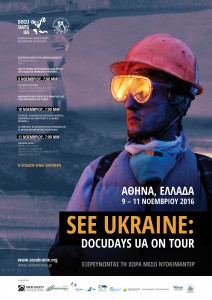 Radical leftists baffle Docudays UA screenings in Athens
On May 13, the project SEE UKRAINE: DOCUDAYS UA ON TOUR started in Athens. On the eve of the opening the managers of the Exile Room, the main festival venue in Greece, refused to host the festival events after radical groups' call for a protest rally near the location. The organizers addressed the Embassy of Ukraine to the Hellenic Republic urgently with a request to host the screenings and discussions in its premises.
In the evening of May 13, while the film "Euromaidan. Rough Cut" was being screened at the opening of the festival, the rally of pro-Russian forces, who called themselves "Greek anti-fascists", gathered next to the Exile Room. After the meeting, a group of young people headed towards the gallery which would have to host the Ukrainian photographer Oleksandr Hliadelov's exhibition "Hey, brother?". They threatened the gallery owners and accused them of supporting the Ukrainian nazis.
It is reported that the local radical sources spread false information about the project "See Ukraine", distort the facts and accuse the organizers of the attempts to slander the residents of Crimea and Donbas, although the program contains no films on a similar topical.
"Through the example of cultural diplomacy initiative of the Docudays UA we have seen how the information campaign against Ukraine is being waged and how it is important not to succumb to provocations and not to believe that the Greeks are hostile to Ukrainians. They are not. Pro-Russian forces deliberately create this myth, trying to quarrel two countries with each other. This is why we held the first part of the festival in Greece despite the difficulties," said Olha Birzul, the PR-coordinator of the project "See Ukraine: Docudays UA on Tour."
During three days, the viewers in Athens had the opportunity to watch short films of Ukrainian filmmakers: "Doctor comes last" by Svitlana Shymko and "Sirs and signors" by Oleksandr Techynsky. Moreover, the discussion "Where is Ukraine heading after Euromaidan" was held, involving Ukrainian-Greek experts: philosopher Volodymyr Yermolenko, journalist Tetyana Oharkova, Greek professor of geostrategy Nikos Liheros and historian Michalis Varlasa.
"First of all, we were impressed by how much the audience was interested in the discussion. The people had a lot of questions concerning the state of affairs in Ukraine, fighting against corruption, power of the Ukrainian civil society, as well as Russian aggression, causes of the annexation of Crimea and the future of the Donbas, - says Tetyana Ogarkova (Ukraine Crisis Media Center, Hromadske TV). – Also, we talked about difficultues in explaining the pro-European choice of Ukraine in Greece, a country with a strong Eurosceptic background."
"We should continue to do everything possible to convey information about Ukraine to the international audience. It is important to speak of the power of Ukrainian society, the rise of a new Ukraine, and the nature of Russian aggression that threatens the entire world order," said Volodymyr Yermolenko, the member of the NGO "Internews-Ukraine."
The festival team truly appreciates the assitance of the Association of the Ukrainian Diaspora in Greece "Ukrainian - Hellenic Thought" in organizing the film screenings of SEE UKRAINE: DOCUDAYS UA ON TOUR, as well as the Ukrainian Embassy which agreed to host the events.
For the time being the team of SEE UKRAINE has suspended the second part of the project, scheduled for May, 26-28, with the aim of finding more secure venues.
Radical leftists baffle Docudays UA screenings in Athens
On May 13, the project SEE UKRAINE: DOCUDAYS UA ON TOUR started in Athens. On the eve of the opening the managers of the Exile Room, the main festival venue in Greece, refused to host the festival events after radical groups' call for a protest rally near the location. The organizers addressed the Embassy of Ukraine to the Hellenic Republic urgently with a request to host the screenings and discussions in its premises.
In the evening of May 13, while the film "Euromaidan. Rough Cut" was being screened at the opening of the festival, the rally of pro-Russian forces, who called themselves "Greek anti-fascists", gathered next to the Exile Room. After the meeting, a group of young people headed towards the gallery which would have to host the Ukrainian photographer Oleksandr Hliadelov's exhibition "Hey, brother?". They threatened the gallery owners and accused them of supporting the Ukrainian nazis.
It is reported that the local radical sources spread false information about the project "See Ukraine", distort the facts and accuse the organizers of the attempts to slander the residents of Crimea and Donbas, although the program contains no films on a similar topical.
"Through the example of cultural diplomacy initiative of the Docudays UA we have seen how the information campaign against Ukraine is being waged and how it is important not to succumb to provocations and not to believe that the Greeks are hostile to Ukrainians. They are not. Pro-Russian forces deliberately create this myth, trying to quarrel two countries with each other. This is why we held the first part of the festival in Greece despite the difficulties," said Olha Birzul, the PR-coordinator of the project "See Ukraine: Docudays UA on Tour."
During three days, the viewers in Athens had the opportunity to watch short films of Ukrainian filmmakers: "Doctor comes last" by Svitlana Shymko and "Sirs and signors" by Oleksandr Techynsky. Moreover, the discussion "Where is Ukraine heading after Euromaidan" was held, involving Ukrainian-Greek experts: philosopher Volodymyr Yermolenko, journalist Tetyana Oharkova, Greek professor of geostrategy Nikos Liheros and historian Michalis Varlasa.
"First of all, we were impressed by how much the audience was interested in the discussion. The people had a lot of questions concerning the state of affairs in Ukraine, fighting against corruption, power of the Ukrainian civil society, as well as Russian aggression, causes of the annexation of Crimea and the future of the Donbas, - says Tetyana Ogarkova (Ukraine Crisis Media Center, Hromadske TV). – Also, we talked about difficultues in explaining the pro-European choice of Ukraine in Greece, a country with a strong Eurosceptic background."
"We should continue to do everything possible to convey information about Ukraine to the international audience. It is important to speak of the power of Ukrainian society, the rise of a new Ukraine, and the nature of Russian aggression that threatens the entire world order," said Volodymyr Yermolenko, the member of the NGO "Internews-Ukraine."
The festival team truly appreciates the assitance of the Association of the Ukrainian Diaspora in Greece "Ukrainian - Hellenic Thought" in organizing the film screenings of SEE UKRAINE: DOCUDAYS UA ON TOUR, as well as the Ukrainian Embassy which agreed to host the events.
For the time being the team of SEE UKRAINE has suspended the second part of the project, scheduled for May, 26-28, with the aim of finding more secure venues.
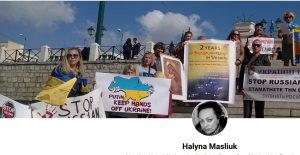
A journalist and the head of the Association of the Ukrainian Diaspora in Greece "Ukrainian - Hellenic Thought"
See Ukraine speaks out against political myths
On the whole, Greeks, just like Ukrainians, receive the lion's share of imformation from unreliable sources. Even so, there is a local saying stating that one image is worth a thousand words. In this respect the festival See Ukraine: Docudays UA on tour seems to be unique for the Greek society and its Ukrainian community. With the help of the expressive cinematic language, the project will share some perspectives on the reality of Ukraine and become a meeting place for experts from both countries, who will talk to the audience about the most uncomfortable and complex issues during topic-based discussions.
Despite the fact that Ukraine and Greece have a thousand-year common history, Greek viewers have very little understanding of the Ukrainian cinema. It is difficult to embrace all the history, which famously starts in the Monastery of Great Lavra (Mount Athos), where the first written record about the Kyivan Russian monkhood is kept. During the year of the Soviet Iconoclasm any references to the importance of Athos for the Ukrainian culture and spirituality were denied. Possibly, because of this spiritual commonality, Ukrainian and Greek community have always worked closely in different parts of the world.
The lack of information about Ukraine is also related to the fact that Greece traditionally belongs to the sphere of influence of Russia. The Greek audience tends to be benevolent to the Russian media sources and has a vague, if not misleading, notion about Ukraine, repeating the myths that the Ukrainian language and state have never existed. For decades, social thinking in Greece has been influenced by the Soviet documentary and feature films which have also systematically been broadcast for the past 25 years after the collapse of the Soviet empire and during the establishment of the independent Ukrainian state. The new waves of the Russian propaganda, which have become part of the so-called hybrid war 2014-2016, make the Greek society even more misinformed. Greece which is also going through a severe political and economic crises is misled into believing that Russia, "friendly nation which shares the same religion", is willing to come to the rescue.
The passionate activism of the Ukrainian community in Greece looks uncomfortable, if not merely incomprehensible, to the majority of Greeks, as this political position disproves the Russian propaganda interpretation according to which Ukrainians in East Ukraine have rebelled against fascism. One needs to cope with this, break the stereotypes, search for information, even change one's mindset. It is really complicated. Why should the Ukrainians be a separate nation? Why should they speak their native language? Why should they fight for their independence? However, freedom and struggle for independence are essential concepts for Greeks. In this respect, Greek Ukrainians' position causes a lot of anxiety in the Greece.
The beginning of the open military aggression of Russia towards Ukraine in 2014 acted as a catalyst for political activism of Ukrainians all over the world. Greece was not an exception. The majority of Ukrainians from different regions of the country became conscious of their national identity. They realized that they want their native land to remain independent, to embrace European democratic values and get rid of the oppressive Soviet legacy. They took to the streets of Athens with blue-and-yellow flags, wearing vyshyvankas and wreaths and holding posters with slogans against the Russian aggression, against the annexation of Crimea and in support of the illegally imprisoned hostages of the Kremlin. They created a powerful volunteer movement and launched an information website. Freedom is undoubtedly above all else for any nation. And now Ukrainians feel proud of their land and their heroes, who are willing to die for the freedom of Ukraine. And the members of our Ukrainian community do their best to inform the Greek society about Ukraine and its heroic people. That is why See Ukraine: Docudays UA on tour must come to Greece.
